The advisory board of the TCLab consists of eminent scholars and practitioners concerned with international economic development planning, technology and labour issues.
The Lab is honored to have a new Advisory Board member, Jorge Katz, Professor of Economic Growth and Innovation at the Universidad de Chile.
Current Board Members:
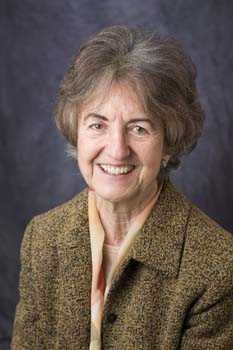 |
Lourdes Beneria is Professor of City and Regional Planning at Cornell University. Her research centers on gender and development, labor markets, women's work, globalization, European integration, and Latin American development. She formerly directed the International Studies in Planning program (ISP, 2003-2005), the Latin American Studies Program (LASP, 1993-1997) and the Gender and Global Change program (GGC, 1988-1993 and 1999-2003). Benería served on the International Advisory Committee for the UNIFEM report on World's Women's Progress/2000 and is a member of the International Advisory Board for the International Labor Organization's Global Programme on Socioeconomic Security. She has been a member of the Research Advisory Council of the Economic Policy Institute in Washington, D.C. and is a current member of UNDP's Directory of Appointed Experts on Poverty in Latin America and the Caribbean. Her current work focuses on labormarket informalization, poverty, and urban change in Latin America. |
 |
Martha Chen is a Lecturer in Public Policy at the Kennedy School of Government and Coordinator of Women in Informal Employment: Globalizing and Organizing (WIEGO). An experienced development practitioner and scholar, her areas of specialization are gender and development, poverty alleviation, and the informal economy. She has resident experience in Bangladesh working with one of the world's largest non-governmental organizations (BRAC), and in India where she served as field representative of Oxfam America for India and Bangladesh. Since joining Harvard in 1987, she has undertaken three major field studies in India; pursued research on women's role in development; introduced four new courses on development; served as a Visiting Professor at Radcliffe College; written or edited six books and numerous articles; provided advisory services to various donor agencies and non-governmental organizations; and co-founded a research-policy network in support of workers in the informal economy called WIEGO. Dr. Chen received a Ph.D. in South Asia Regional Studies from the University of Pennsylvania. |
 |
Jorge Katz was born in Buenos Aires, Argentina in 1940. He received his first degree in Economics at the University of Buenos Aires in 1964 and completed his D.Phil in Economics at Nuffield College, Oxford, in 1967. His doctoral dissertation "Production Functions, Foreign Investment and Growth", was published by North Holland Publishing Company in 1969. After returning to Argentina he was appointed professor of economics at the University of Bs.As, where he lectured on Industrial Organization and Economic Development in Argentina. As from 1994 to 2003 he acted as Director of the Division of Production, Productivity and Management, at ECLAC, Santiago de Chile. After retiring from the UN System in 2003 he joined the University of Chile as Professor of Economic Growth and Innovation. He has published extensively both on Technology and Innovation and on Health Economics in Latin America. |
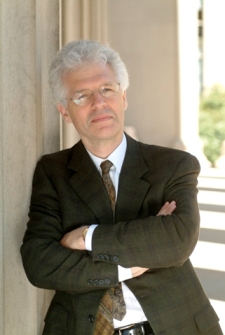 |
Richard Lester is the founder and current director of the Industrial Performance Center (IPC) and a professor of nuclear science and engineering at the Massachusetts Institute of Technology. His research focuses on industrial innovation and the management of technology. He has led several major studies of national and regional productivity, competitiveness and innovation performance commissioned by governments and industrial groups around the world. He is currently leading the Local Innovation Systems Project, an international research collaboration based at the IPC on the technological transformation of industries in regional economies and the role of universities in that process. Professor Lester’s book on the sources of creativity and innovation in advanced economies, Innovation – The Missing Dimension, co-authored with Michael J. Piore, was published by Harvard University Press in 2004. Other recent books include Making Technology Work: Applications in Energy and the Environment (Cambridge University Press, 2004), jointly authored with John M. Deutch, The Productive Edge: A New Strategy for Economic Growth (W.W. Norton, 2000), and Global Taiwan (M.E. Sharpe, 2005), co-edited with Suzanne Berger. Professor Lester is also active in research and teaching on energy technology applications and the management and control of nuclear technology. He is a co-author of two recent interdisciplinary MIT studies on The Future of Nuclear Power (2003) and The Future of Coal (2007). |
 |
Richard R. Nelson is an economist by training. Over his career he has taught at Oberlin College, Carnegie Mellon University, Yale University, and Columbia University. He now heads the program on Science, Technology, and Global Development, at the Columbia Earth Institute, and is George Blumenthal Professor of International and Public Affairs, Business, and Law, at Columbia, Emeritus He has served as research economist and analyst at the Rand Corporation, and at the President’s Council of Economic Advisors. He was director of the Institute for Social and Policy Studies at Yale University, and has directed Columbia’s Public Policy Doctoral Consortium. His central interests have been in long-run economic change. Much of his research has been directed toward understanding technological change, how economic institutions and public policies influence the evolution of technology, and how technological change in turn induces institutional and economic change more broadly. His work has been both empirical and theoretical. Along with Sidney Winter, he has pioneered in trying to develop a way of economic theorizing that recognizes explicitly that the economy is almost always undergoing change, most of it unpredictable, and that theories that assume that economic agents understand well the context in which they are operating, and that the system is in equilibrium, are inadequate for analysis of many important economic questions. His book with Winter, An Evolutionary Theory of Economic Change,is widely recognized as a landmark in this field. Over the course of his career, he has been particularly attracted to working with and coordinating relatively large research teams. His National Innovation Systems project involved a team of approximately twenty scholars, and his study on The Sources of Industrial Leadership involved the coordination of a similar-size group. Recently he orchestrated a study which resulted in the book The Limits of Market Organization, published by Russell Sage. He currently is orchestrating a large multi faceted project that is studying various aspects of economic development as a learning process. |
Michael J. Piore is currently the David W. Skinner Professor of Political Economy at MIT. He earned his undergraduate and graduate degrees at Harvard University, where he wrote his doctoral dissertation under the direction of John T. Dunlop. He has been on the faculty of the Department of Economics at MIT since 1966, and also currently holds a joint appointment with the Department of Political Science. He is director of the MIT-Mexico Program and an affiliate of both the Center for International Studies and the Industrial Performance Center. Piore is best known for the development of the concept of the internal labor market and the dual labor market hypothesis and, more recently, for work on the transition from mass production to flexible specialization. He has worked on a number of labor market and industrial relations problems, including low income labor markets, the impact of technological change upon work, migration, labor market segmentation and the relationship between the labor market, business strategy and industrial organization. His most recent book, Innovation, The Missing Dimension (with Richard Lester [Harvard University Press, 2004]), argues for the role of interpretation alongside rational decision making in the innovative process, and the importance of public space, sheltered from the pressures of the competitive market, in the interpretative process. Earlier books include Beyond Individualism, The Second Industrial Divide (with Charles Sabel), Birds of Passage: Migrant Labor and Industrial Society, Dualism and Discontinuity in Industrial Society (with Suzanne Berger), and Internal Labor Markets (with Peter Doeringer). He is currently working on new forms of labor market regulation in the United States as a response to a shift in the axes of social and political mobilization from economic class to social identities associated with race, sex, ethnicity, age, and disability. He is also working on the contrast between labor market regulation in the United States and forms of regulation in Mexico and Latin America. The central themes in Piore's work are the social, institutional and cognitive dimensions of economic activity. Piore is a member of the Executive Board of the Society for the Advancement of Socio-economics. He was a MacArthur Prize Fellow (1984-1989), a member of the Executive Committee of the American Economic Association (1990-1995), and a member of the Governing Board of the Institute for Labour Studies of the International Labour Organization (1990-1996). In addition to the ILO, Piore has worked with many other international organizations, foreign governments, U.S. government agencies, state governments, and nonprofit organizations including the NAACP Legal Defense Fund, the AFL-CIO, and the Social Science Research Council. He holds a Docteur HONORIS CAUSA from Université des Science et Technologies de Lille. |
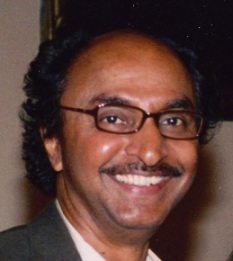 |
Dr. Bishwapriya Sanyal is Ford International Professor of Urban Development and Planning, Director of the Special Program for Urban and Regional Studies and Humphrey Program Coordinator in MIT’s Department of Urban Studies and Planning, and Faculty Chair-Elect of MIT (2007-2009). Educated as an Architect Planner with a doctorate from University of California at Los Angeles, Dr. Sanyal has advised bilateral and multi-national donors, including the Ford Foundation, World Bank, International Labour Organization, United Nations Center for Human Settlements, United Nations Development Program, and the United States Agency for International Development. He has conducted research in India, Bangladesh, Zambia, Kenya, Jordan, Lebanon, Brazil, and Curaçao. Dr. Sanyal’s recent publications include: Comparative Planning Cultures, Routledge, May 2005; The Profession of City Planning: Changes, Successes, Failures and Challenges (1900-2000) (co-edited with L. Rodwin), Rutgers University Press; and High Technology and Low-Income Communities: Prospects for the Positive Use of Advanced Information Technology (edited with W. Mitchell and D. Schön), MIT Press, 1998. He has also written extensively on planning education issues, including the book Breaking the Boundaries: A One-World Approach to Planning Education, Springer,1990. His current research project analyzes the role of informal sector labor unions in the modernization of public sector agencies in developing nations. |
 |
Elliott Sclar is Professor of Urban Planning and Public Affairs at Columbia University. He holds senior appointments in the Graduate School of Architecture, Planning, and Preservation and the School of International and Public Affairs. He is the Director of the Center for Sustainable Development at Columbia University's Earth Institute. Professor Sclar was the co-coordinator of the Taskforce on Improving the Lives of Slum Dwellers. It was one of the ten taskforces set up by the UN Millennium Project to help guide the implementation of the United Nation's Millennium Development Goals. The Taskforce's book length report (2005): A Home in the City (PDF download), is available on the UN Millennium Project website and from Earthscan. As a professional economist, Professor Sclar has written extensively about the strengths and limitations of markets as mechanisms for effective public policy implementation. The main focus of this Center will be to work at the nexus that connects the regulatory mechanisms of planning with market-based incentives to create environmentally and economically sustainable urban development. Sclar's book "You Don't Always Get What You Pay For: The Economics of Privatization," a critique of over reliance on market mechanisms, has won two major academic prizes; the Louis Brownlow Award for the Best Book of 2000 from the National Academy of Public Administration and the 2001 Charles Levine Prize from the International Political Science Association for a major contribution to the public policy literature. It is a definitive work in the field. In recent years Sclar has been a leading figure in a scholarly movement to reconnect the work of population health experts and urban planners in creating healthier cities. (See his recent series of articles in The Lancet, American Journal of Public Health, the Journal of Urban Health and a report published by the Transportation Research Board Institute of Medicine. One of the main challenges he sees is the need to begin to develop more precise measurements of built environment impacts on population health. |
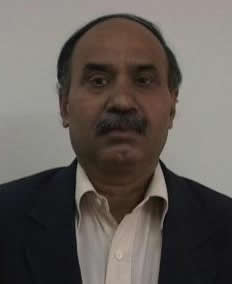 |
Alakh Sharma is presently a Professor and Director of the Institute for Human Development, New Delhi. Earlier he was a Senior Visiting Fellow, Institute of Economic Growth, Delhi; Advisor (Research), V.V. Giri National Labour Institute, Noida; Professor, Shri Ram Centre for Industrial Relations, New Delhi; and a faculty member, A.N. Sinha Institute of Social Studies, Patna for several years. He has made significant contributions to research in areas such as poverty, migration, employment and labour markets. He has authored/edited/co-edited twelve books and published over three dozen research papers in various journals. He is also editor of the Indian Journal of Labour Economics and co-editor of the Indian Journal of Human Development. |
 |
Sri R.K.A. Subrahmanya, a post graduate in economics joined the Indian Audit and Accounts Service after passing the IAS and Central Services Combined Competitive Examination in 1950. He was Accountant General in Assam Orissa,Tamilnadu and Kerala. He was appointed Addl Secretary in the Union Ministry of Labor in 1979 where he was mainly concerned with labor welfare, social security and wages. He was Chairman of the Central Board of Trustees of the EPFO, the Standing Committee of the ESIC and the Central Board of Workers Education for some time. He represented the Government of India in the International Labor Conferences held in Geneva for four years out of which he was elected as Chairman of Conference Committees, including the one on Social Dimensions of Industrialisation in three consecutive years. He was a member of a committee set up by the ILO for studying the future of social security in developing countries. He was a member of the Bureau ( governing body) of the International Social Security Association , (an association of social security institutions such as the ESIC and the EPFO )for full five years. After retiring from service in 1984 he was Director General, Gandhi Labor Institute, Ahmedabad for some time before he was appointed as a Member of the A.P.Administrative Tribunal in Hyderabad. After his term in the Tribunal ended he joined the National Labor Law Association where he was the Coordinator of the Research Project called Simplification Rationalisation and Consolidation of Labor Laws and was largely responsible for the production of the book India Labor Code 1994. |
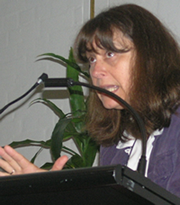 |
Judith Sutz is Academic Coordinator of the University Research Council of the Universidad de la Republica, Uruguay and Professor of Science, Technology and Society. Her research work deals with the specific conditions for innovation in developing countries and with the production and social use of knowledge in such countries. She was Secretary of Science, Technology and Development of the Latin American Commission of Social Sciences and member of the Task Force on Science, Technology and Innovation of the UN Millennium Development Project. She is Advisory Editor of Research Policy and a member of the World Academy of Arts and Sciences. |

